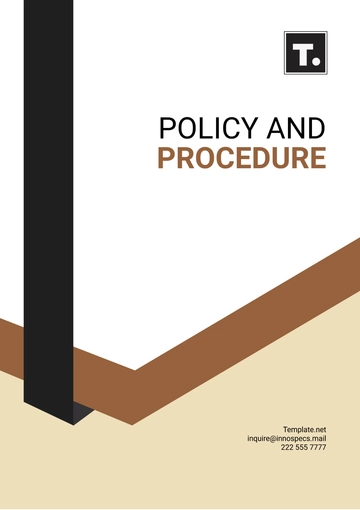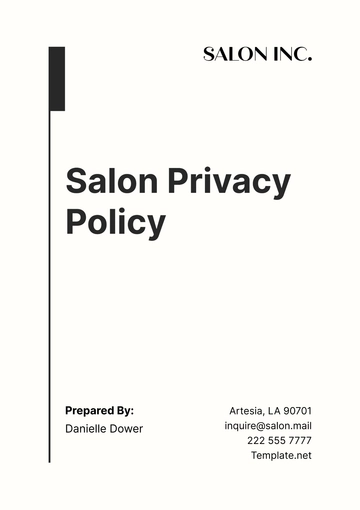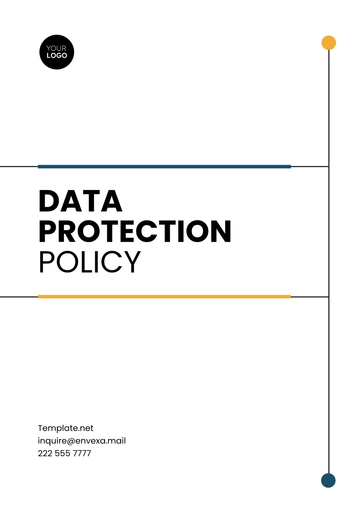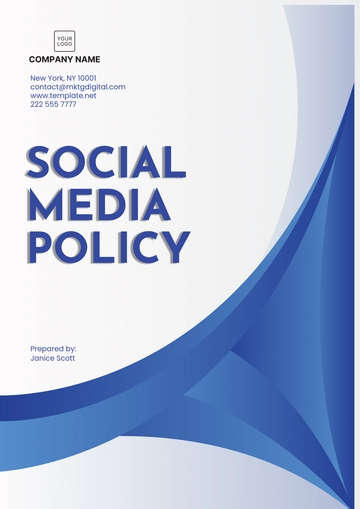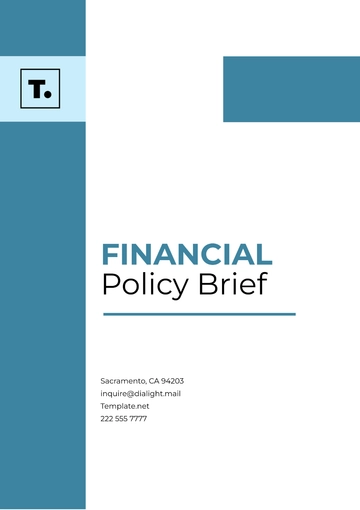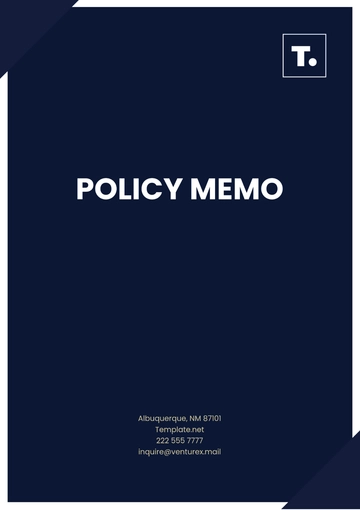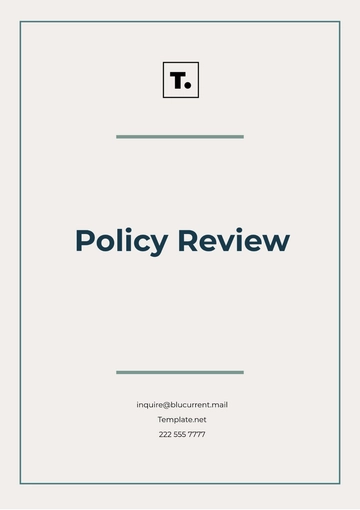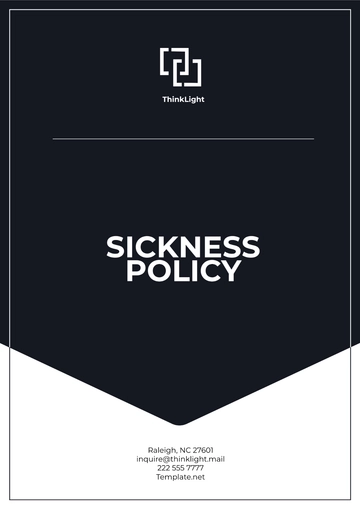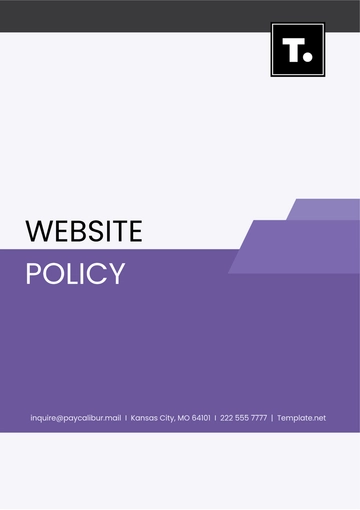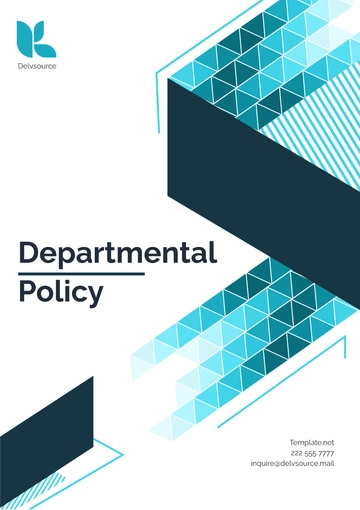Free Spa & Beauty Salon Cancellation Policy
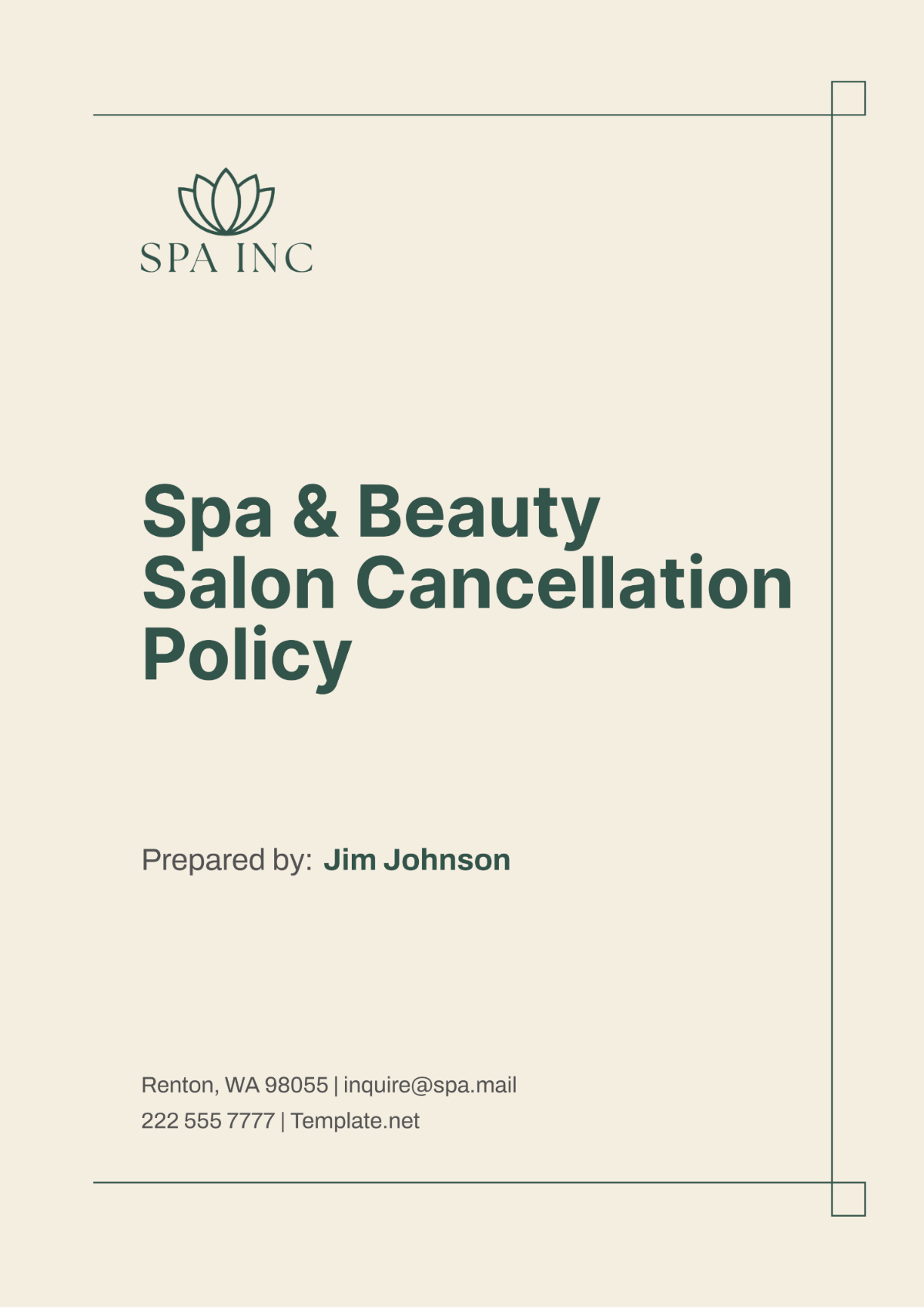
I. Introduction
A. Purpose of the Policy
The purpose of this Cancellation Policy is to establish clear guidelines for spa appointment cancellations at [Your Company Name]. This policy ensures that both the spa and its clients understand the expectations and procedures related to appointment cancellations.
Clarify Cancellation Procedures: This policy outlines the steps clients need to follow to cancel or reschedule appointments. Clear procedures help reduce misunderstandings and ensure smooth operations.
Manage Appointment Slots Efficiently: By having a clear cancellation policy, the spa can manage appointment slots more effectively, minimizing revenue loss from last-minute cancellations or no-shows.
Ensure Fairness for All Clients: The policy aims to balance the needs of all clients, ensuring that appointment times are respected and available slots are fairly distributed.
B. Scope of the Policy
This policy applies to all clients of [Your Company Name], covering all types of spa and beauty treatments offered. It details the timelines and conditions under which cancellations or rescheduling are accepted.
All Treatment Types: Whether a client has booked a massage, facial, or any other service, this policy applies universally to ensure consistency.
Client Responsibility: It is the client's responsibility to understand and adhere to this policy when booking and managing their appointments.
Staff Enforcement: Spa staff are responsible for enforcing this policy and ensuring clients are aware of it when making appointments.
Communication Channels: This policy also specifies the acceptable methods for clients to communicate cancellations or rescheduling requests.
C. Communication of the Policy
To ensure all clients are informed of the cancellation policy, [Your Company Name] will communicate it through various channels, including the spa's website, appointment confirmation emails, and at the time of booking.
Website Information: The cancellation policy will be prominently displayed on the spa's website for easy access by all clients.
Appointment Confirmation: Details of the policy will be included in appointment confirmation emails and reminders sent to clients.
In-Person Communication: Spa staff will verbally inform clients of the policy when appointments are booked in person or over the phone.
Printed Materials: The policy will be available in printed form at the reception area for clients to review.
II. Cancellation Notice Period
Providing adequate notice for cancellations is crucial for managing the spa's schedule. The following table outlines the notice periods required for different types of appointments at [Your Company Name]:
Appointment Type | Notice Period |
|---|---|
Regular Treatments | 24 hours |
Extended Sessions | 48 hours |
Group Bookings | 72 hours |
A. Regular Treatments
For regular treatments, clients must provide at least 24 hours' notice to cancel or reschedule their appointments. This notice period allows the spa to fill the vacant slot with another client, minimizing revenue loss.
Adequate Notice: Requiring 24 hours' notice helps manage the spa's schedule effectively. It gives enough time to potentially rebook the slot with another client.
Flexibility for Clients: A 24-hour notice period is reasonable and allows clients some flexibility in managing their schedules while respecting the spa's operational needs.
Reduced No-Shows: By enforcing this notice period, the spa can reduce the incidence of no-shows, ensuring better utilization of staff time.
Improved Client Relations: Clear communication about the notice period helps maintain positive relationships with clients, as they understand and adhere to the policy.
B. Extended Sessions
For extended sessions, such as longer massages or combination treatments, a 48-hour notice period is required. These sessions typically occupy more time slots, making it essential to have more advanced notice for cancellations.
Advanced Planning: Extended sessions require more planning and resources, necessitating a longer notice period for cancellations or rescheduling.
Optimized Scheduling: A 48-hour notice allows the spa to optimize its schedule and reallocate resources effectively, ensuring minimal disruption.
Resource Management: Longer sessions often involve more significant resource allocation, and adequate notice helps in better management and planning.
Client Awareness: Clients booking extended sessions are informed of the longer notice requirement, ensuring they understand the importance of timely cancellations.
C. Group Bookings
Group bookings, which involve multiple clients, require a 72-hour notice period. Managing group appointments is more complex, and adequate notice helps in adjusting the schedule to accommodate other clients.
Complex Coordination: Group bookings involve coordinating multiple schedules, making a 72-hour notice essential for effective management.
Maximized Revenue: Longer notice periods for group bookings help maximize revenue by allowing the spa to rebook the slots effectively.
Enhanced Client Experience: Ensuring group bookings are managed efficiently enhances the overall client experience, as group events are often special occasions.
Operational Efficiency: Adequate notice for group bookings helps maintain operational efficiency and ensures all clients receive the best possible service.
Providing clear notice periods for different types of appointments helps manage the spa's schedule effectively and ensures clients understand their responsibilities. By enforcing these notice periods, [Your Company Name] can minimize disruptions and maintain high standards of service.
III. Cancellation Fees
To discourage last-minute cancellations and no-shows, [Your Company Name] implements cancellation fees based on the timing of the cancellation. The following table outlines the fees associated with different notice periods:
Notice Period | Fee Percentage |
|---|---|
More than 24 hours | 0% |
12-24 hours | 50% |
Less than 12 hours | 100% |
A. More than 24 Hours
If a client cancels their appointment more than 24 hours in advance, no cancellation fee is charged. This policy encourages clients to provide timely notice, allowing the spa to rebook the slot.
No Fee Incentive: Clients are motivated to cancel well in advance to avoid any fees, helping the spa manage its schedule effectively.
Flexible Policy: Offering a no-fee option for timely cancellations demonstrates flexibility and fairness, enhancing client relations.
Rebooking Opportunities: With more than 24 hours' notice, the spa has ample time to rebook the slot, minimizing potential revenue loss.
Positive Client Experience: Clients appreciate the opportunity to cancel without penalty, contributing to a positive overall experience with the spa.
B. 12-24 Hours
For cancellations made between 12 and 24 hours before the appointment, a fee of 50% of the service cost is charged. This fee compensates for the reduced opportunity to rebook the slot.
Partial Compensation: Charging a 50% fee provides partial compensation for the spa's lost revenue and the difficulty of rebooking the slot on short notice.
Encourages Early Notice: The fee structure encourages clients to cancel as early as possible, reducing the likelihood of last-minute disruptions.
Balancing Act: This fee strikes a balance between compensating the spa and being fair to clients who may need to cancel on shorter notice due to unforeseen circumstances.
Operational Stability: Ensuring some compensation for late cancellations helps maintain the spa's financial stability and operational efficiency.
C. Less than 12 Hours
Cancellations made less than 12 hours before the appointment are charged 100% of the service cost. This policy aims to discourage very late cancellations and ensure that the spa is compensated for the lost revenue.
Full Compensation: Charging 100% of the service cost fully compensates the spa for the lost opportunity to rebook the slot on very short notice.
Discourages Last-Minute Cancellations: A full fee discourages clients from canceling at the last minute, helping maintain a stable and predictable schedule.
Fairness to Staff: Ensuring that the spa and its staff are compensated for last-minute cancellations is fair, as they have reserved time and resources for the appointment.
Client Responsibility: This policy emphasizes the importance of clients adhering to their appointment commitments, fostering a sense of responsibility.
Implementing a structured cancellation fee policy helps manage the spa's schedule and compensates for lost revenue. By clearly communicating these fees, [Your Company Name] can encourage timely cancellations and reduce the impact of no-shows on its operations.
IV. Rescheduling Policy
Rescheduling appointments is sometimes necessary, and [Your Company Name] provides clear guidelines for doing so. The following table outlines the rescheduling notice periods required for different types of appointments:
Appointment Type | Notice Period |
|---|---|
Regular Treatments | 24 hours |
Extended Sessions | 48 hours |
Group Bookings | 72 hours |
A. Regular Treatments
Clients wishing to reschedule regular treatments must provide at least 24 hours' notice. This notice period allows the spa to adjust its schedule and accommodate the new appointment time.
Timely Rescheduling: A 24-hour notice period for rescheduling helps ensure that the spa can efficiently manage its schedule and minimize disruptions.
Flexible Options: Allowing clients to reschedule with adequate notice provides flexibility and accommodates their changing schedules.
Operational Efficiency: Ensuring timely notice for rescheduling helps maintain operational efficiency and reduces the impact on other clients.
Client Satisfaction: Providing clear guidelines for rescheduling enhances client satisfaction by offering flexibility without compromising service quality.
B. Extended Sessions
For rescheduling extended sessions, clients must provide at least 48 hours' notice. Extended sessions require more planning, and adequate notice ensures smooth rescheduling.
Advanced Notice Required: A 48-hour notice period for rescheduling extended sessions ensures that the spa can adequately prepare for the new appointment time.
Resource Management: Extended sessions often require more resources, and adequate notice allows for better management and planning.
Reduced Disruptions: Ensuring timely notice for rescheduling helps reduce disruptions and maintain a stable schedule.
Enhanced Client Experience: Providing clear guidelines for rescheduling extended sessions enhances the client experience by offering flexibility and ensuring high service standards.
C. Group Bookings
Group bookings require at least 72 hours' notice for rescheduling. Managing multiple clients' schedules necessitates longer notice to ensure smooth adjustments.
Longer Notice for Groups: A 72-hour notice period for rescheduling group bookings ensures that the spa can effectively manage multiple schedules.
Coordinated Efforts: Group bookings involve coordinating several clients, and adequate notice allows for better planning and coordination.
Optimized Schedule: Ensuring timely notice for rescheduling helps optimize the spa's schedule and reduce potential disruptions.
Client Convenience: Providing clear guidelines for rescheduling group bookings enhances client convenience and satisfaction.
Implementing a structured rescheduling policy helps manage the spa's schedule and ensures clients are aware of their responsibilities. By clearly communicating these guidelines, [Your Company Name] can provide flexibility while maintaining operational efficiency.
V. No-Show Policy
No-shows significantly impact the spa's operations and revenue. The following table outlines the no-show penalties for different types of appointments at [Your Company Name]:
Appointment Type | No-Show Penalty |
|---|---|
Regular Treatments | 100% of service |
Extended Sessions | 100% of service |
Group Bookings | 100% of service |
A. Regular Treatments
Clients who do not show up for their regular treatment appointments without prior notice will be charged 100% of the service cost. This penalty compensates the spa for the lost revenue and the reserved time slot.
Full Compensation: Charging 100% of the service cost fully compensates the spa for the lost opportunity to rebook the slot.
Discourages No-Shows: A full fee discourages clients from not showing up, helping maintain a stable and predictable schedule.
Operational Impact: Ensuring that the spa is compensated for no-shows helps mitigate the impact on operations and revenue.
Client Accountability: This policy emphasizes the importance of clients adhering to their appointment commitments, fostering a sense of accountability.
B. Extended Sessions
No-shows for extended sessions are also charged 100% of the service cost. These sessions occupy significant time slots, and the penalty ensures the spa is compensated for the lost revenue.
Significant Impact: No-shows for extended sessions have a significant impact on the spa's schedule and revenue, necessitating a full penalty.
Resource Allocation: Extended sessions require more resources, and ensuring full compensation helps manage the impact of no-shows.
Operational Stability: Charging a full fee for no-shows helps maintain operational stability and financial health.
Client Awareness: Clients booking extended sessions are informed of the no-show policy, ensuring they understand the importance of adhering to their appointment commitments.
C. Group Bookings
Group bookings that result in no-shows are charged 100% of the service cost for each member of the group. This penalty compensates the spa for the significant time and resources reserved for the group appointment.
Coordinated Efforts: Group bookings involve significant coordination, and no-shows have a considerable impact, necessitating a full penalty.
Resource Management: Ensuring full compensation for group booking no-shows helps manage the impact on resources and operations.
Revenue Protection: Charging a full fee for no-shows protects the spa's revenue and ensures financial stability.
Client Responsibility: This policy emphasizes the importance of clients adhering to their group booking commitments, fostering accountability.
Implementing a no-show policy helps manage the spa's schedule and compensates for lost revenue. By clearly communicating these penalties, [Your Company Name] can encourage clients to adhere to their appointment commitments and reduce the incidence of no-shows.
VI. Late Arrivals
Late arrivals disrupt the spa's schedule and affect other clients. The following table outlines the guidelines for handling late arrivals at [Your Company Name]:
Delay Duration | Action Taken |
|---|---|
Up to 15 minutes | Service shortened accordingly |
More than 15 minutes | Appointment may be rescheduled or canceled |
A. Up to 15 Minutes
Clients arriving up to 15 minutes late will have their service shortened accordingly to avoid disrupting the schedule of subsequent clients. This ensures that the spa can maintain its schedule and accommodate all clients fairly.
Service Adjustment: Shortening the service for late arrivals helps keep the spa's schedule on track, minimizing disruptions for other clients.
Fairness to Clients: Ensuring that late arrivals do not impact other clients' appointments maintains fairness and service quality.
Operational Efficiency: Adjusting services for late arrivals helps maintain operational efficiency and prevents cascading delays.
Client Awareness: Clients are informed of this policy to encourage punctuality and ensure they understand the impact of arriving late.
B. More than 15 Minutes
Clients arriving more than 15 minutes late may have their appointment rescheduled or canceled, depending on the availability of staff and resources. This policy aims to minimize disruptions and ensure efficient use of the spa's resources.
Rescheduling or Cancellation: Rescheduling or canceling appointments for late arrivals helps manage the spa's schedule and resources effectively.
Minimized Disruptions: Ensuring that late arrivals do not significantly impact other appointments helps maintain a smooth operational flow.
Client Responsibility: This policy emphasizes the importance of punctuality and helps clients understand the impact of arriving late.
Operational Impact: Managing late arrivals effectively helps reduce operational disruptions and maintain high service standards.
Implementing a policy for late arrivals helps manage the spa's schedule and ensures fairness for all clients. By clearly communicating these guidelines, [Your Company Name] can encourage punctuality and maintain operational efficiency.
VII. Exceptions and Special Considerations
While [Your Company Name] aims to enforce its cancellation policy consistently, certain exceptions and special considerations may apply. The following table outlines situations where exceptions may be made:
Situation | Special Consideration |
|---|---|
Medical Emergencies | Waived cancellation fee |
Family Emergencies | Waived or reduced cancellation fee |
Severe Weather Conditions | Flexible rescheduling |
A. Medical Emergencies
In the case of medical emergencies, [Your Company Name] may waive the cancellation fee. Clients should inform the spa as soon as possible and provide appropriate documentation if required.
Compassionate Approach: Waiving the cancellation fee for medical emergencies demonstrates compassion and understanding.
Client Trust: Ensuring clients feel supported during emergencies helps build trust and loyalty.
Flexible Policy: Offering flexibility for genuine emergencies ensures the policy is fair and client-centric.
Documentation Requirements: Requiring appropriate documentation helps manage the policy's integrity and ensures it is applied consistently.
B. Family Emergencies
Family emergencies may also warrant a waived or reduced cancellation fee. Clients should communicate the situation promptly and provide any necessary documentation.
Supportive Stance: Offering flexibility for family emergencies shows support and understanding for clients' personal situations.
Maintaining Fairness: Ensuring the policy is applied fairly while accommodating emergencies helps maintain a balanced approach.
Client Relations: Demonstrating flexibility and understanding in emergencies enhances client relations and satisfaction.
Documentation for Consistency: Requiring documentation ensures that the policy is applied consistently and fairly across all clients.
C. Severe Weather Conditions
Severe weather conditions that prevent clients from attending appointments may result in flexible rescheduling. Clients should notify the spa as soon as possible to make alternative arrangements.
Safety First: Prioritizing clients' safety during severe weather demonstrates a responsible and client-centric approach.
Flexible Rescheduling: Offering flexible rescheduling options helps accommodate clients affected by severe weather conditions.
Client Understanding: Ensuring clients understand the policy's flexibility in such situations helps manage expectations and satisfaction.
Operational Continuity: Managing severe weather impacts effectively helps maintain operational continuity and service quality.
Implementing a compassionate and flexible approach to exceptions and special considerations helps build client trust and loyalty. By clearly communicating these exceptions, [Your Company Name] can ensure the policy is applied fairly and consistently.
VIII. Communication of the Policy
Effective communication of the cancellation policy is essential to ensure clients are aware of their responsibilities. The following table outlines the communication channels used by [Your Company Name]:
Channel | Description |
|---|---|
Website | Policy details available online |
Appointment Confirmation | Policy included in confirmations |
In-Person Communication | Verbal communication at booking |
Printed Materials | Policy available at reception |
A. Website
The cancellation policy will be prominently displayed on [Your Company Name]'s website, ensuring all clients can easily access and review it. This online presence helps reach a broad audience and provides convenient access to the policy details.
Accessibility: Displaying the policy on the website ensures it is accessible to all clients at any time.
Transparency: Providing clear and detailed policy information online demonstrates transparency and builds client trust.
Ease of Reference: Clients can easily reference the policy when needed, helping them understand their responsibilities.
Comprehensive Information: Including all aspects of the policy online ensures clients are well-informed and aware of the guidelines.
B. Appointment Confirmation
Details of the cancellation policy will be included in appointment confirmation emails and reminders sent to clients. This ensures that clients are reminded of the policy when they book and before their appointments.
Timely Reminders: Including the policy in confirmation emails and reminders ensures clients are reminded of the guidelines at critical times.
Clear Communication: Providing policy details in confirmations helps ensure clients understand their responsibilities and avoid misunderstandings.
Client Convenience: Reminding clients of the policy before their appointments helps them make informed decisions about cancellations or rescheduling.
Enhanced Awareness: Regular reminders of the policy enhance client awareness and adherence to the guidelines.
C. In-Person Communication
Spa staff will verbally inform clients of the cancellation policy when appointments are booked in person or over the phone. This personal communication ensures clients understand the policy and can ask any questions they may have.
Personal Interaction: Verbal communication allows for a personal interaction where clients can ask questions and clarify any doubts.
Immediate Awareness: Informing clients of the policy at the time of booking ensures immediate awareness and understanding.
Client Engagement: Engaging clients in a conversation about the policy helps reinforce its importance and encourage adherence.
Reinforcement: Verbal communication reinforces the information provided through other channels, ensuring comprehensive awareness.
D. Printed Materials
The cancellation policy will be available in printed form at the reception area for clients to review. This ensures that clients who visit the spa in person have easy access to the policy details.
On-Site Availability: Providing printed materials ensures the policy is readily available for clients to review when they visit the spa.
Visual Reminder: Having the policy displayed at reception serves as a visual reminder of the guidelines.
Client Convenience: Offering printed materials ensures clients can review the policy at their convenience and understand their responsibilities.
Comprehensive Coverage: Combining printed materials with other communication channels ensures comprehensive coverage and awareness.
Implementing a multi-channel communication strategy ensures that all clients are well-informed about the cancellation policy. By clearly communicating the policy through various channels, [Your Company Name] can enhance client awareness and adherence to the guidelines.
IX. Continuous Improvement
A. Regular Reviews
[Your Company Name] will conduct regular reviews of the cancellation policy to ensure it meets the needs of the business and its clients. These reviews will involve gathering feedback from clients and staff to identify areas for improvement.
Client Feedback: Gathering feedback from clients helps identify any issues or concerns with the current policy and areas for enhancement.
Staff Input: Involving staff in the review process ensures that their insights and experiences are considered in making policy updates.
Data Analysis: Analyzing data on cancellations and rescheduling can provide valuable insights into the effectiveness of the current policy.
Policy Adjustments: Based on the reviews, necessary adjustments will be made to ensure the policy remains fair and effective.
B. Policy Updates
Updates to the cancellation policy will be communicated to clients and staff promptly. This ensures that everyone is aware of any changes and can adapt accordingly.
Clear Communication: Communicating policy updates clearly ensures that clients and staff understand the changes and their implications.
Client Notifications: Notifying clients of updates through emails, website announcements, and in-person communication ensures comprehensive awareness.
Staff Training: Providing training to staff on any policy updates ensures they can effectively communicate and enforce the new guidelines.
Documentation: Updating all documentation, including online and printed materials, ensures consistency and accuracy in policy communication.
C. Continuous Improvement Culture
Fostering a culture of continuous improvement ensures that [Your Company Name] remains responsive to the needs of its clients and staff. This culture encourages proactive identification of areas for enhancement and ongoing efforts to improve service quality.
Proactive Approach: Encouraging a proactive approach to identifying and addressing issues helps maintain high standards of service.
Client-Centric Focus: Continuously improving the cancellation policy ensures it remains client-centric and meets the evolving needs of the business.
Staff Engagement: Engaging staff in the continuous improvement process fosters a sense of ownership and commitment to maintaining high service standards.
Operational Excellence: A culture of continuous improvement contributes to operational excellence and long-term success.
By committing to continuous improvement, [Your Company Name] ensures that its cancellation policy remains effective, fair, and client-centric. Regular reviews, updates, and a proactive approach to enhancement help maintain high standards and meet the evolving needs of the business and its clients.
- 100% Customizable, free editor
- Access 1 Million+ Templates, photo’s & graphics
- Download or share as a template
- Click and replace photos, graphics, text, backgrounds
- Resize, crop, AI write & more
- Access advanced editor
Streamline cancellation processes with our customizable Spa & Beauty Salon Cancellation Policy Template! This editable resource from Template.net provides a clear and comprehensive policy framework for managing appointment cancellations. Customize the policy to align with your spa's policies and procedures, and utilize the AI Editor Tool for tailored content! Access now!
You may also like
- HR Policy
- Restaurant Policy
- Company Policy
- Accounting Policies and Procedures
- Website Policy
- Privacy Policy
- Safety Policy
- School Policy
- IT and Software Policy
- Law Firm Policy
- Construction Policy
- Interior Design Policy
- Travel Agency Policy
- Education Academic Policy
- Security Policy
- Real Estate Policy
- Expense Policy
- Software Policy



